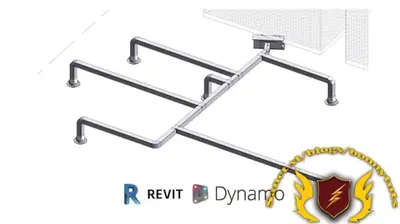Efficient BIM Ducting Design with Revit and Dynamo
Learn to Model from Scratch Ducting Instalations and jump to workflows for autorouting and coordination with Dynamo
What you'll learn
Create MEP System types for Ducting and Set Routing Solutions
Modify correct or create MEP elements to Models.
How to review that information assets comply with the values set.
Create Dynamo Structures for Autorouting Solutions and Change
Extract or Set Elements to solve the Instalation Creation

Requirements
Need to know basics on Autodesk Revit
Need to know Dynamo Modeling Basics for Geometry Analysis and Player or any Related
Be Resilient Curious and Creative
Description
This course is designed to help you accelerate your BIM modeling process by integrating Revit and Dynamo, focusing on ducting installations. MEP modeling, particularly ductwork, is often complex and time-consuming due to its dependency on architectural and structural elements. By utilizing Dynamo’s automation capabilities, you can drastically reduce manual work and make design changes faster and more efficiently.In this course, you'll learn how to model ducting systems from scratch and explore workflows that automate design coordination, autorouting, and modifications.
The course will also cover using Dynamo to create reusable patterns and custom nodes, enabling you to quickly adapt to any design changes or project-specific requirements.Throughout the course, we will guide you through the creation of smart workflows using Dynamo, helping you establish patterns for ducting that can be easily adjusted.
You'll learn how to export data, automate repetitive tasks, and optimize coordination processes to streamline your project workflow.By the end of this course, you will:Have a thorough understanding of ducting systems in Revit and how to apply them effectively.Be able to use Dynamo to enhance and automate ductwork modeling, saving you time and effort.Gain the skills to create dynamic workflows for MEP modeling, ensuring coordination and flexibility throughout the project lifecycle.
Who this course is for
MEP Engineers that believe on rules, patterns and that understand that modeling needs to be a product of analysis and logic not of handcrafted hours of repetition
MEP Engineers that what to solve or model elements by Dynamo use, and change their performance forever
Constructors and Engineers that want to see the capabilities for MEP modeling.
Architects that would seek to develop fully integrated projects
Last updated 10/2024
Created by Enrique Galicia
MP4 | Video: h264, 1280x720 | Audio: AAC, 44.1 KHz, 2 Ch
Level: Beginner | Genre: eLearning | Language: English + subtitle | Duration: 23 Lectures ( 2h 35m ) | Size: 1.93 GB
Download
*
Learn to Model from Scratch Ducting Instalations and jump to workflows for autorouting and coordination with Dynamo
What you'll learn
Create MEP System types for Ducting and Set Routing Solutions
Modify correct or create MEP elements to Models.
How to review that information assets comply with the values set.
Create Dynamo Structures for Autorouting Solutions and Change
Extract or Set Elements to solve the Instalation Creation

Requirements
Need to know basics on Autodesk Revit
Need to know Dynamo Modeling Basics for Geometry Analysis and Player or any Related
Be Resilient Curious and Creative
Description
This course is designed to help you accelerate your BIM modeling process by integrating Revit and Dynamo, focusing on ducting installations. MEP modeling, particularly ductwork, is often complex and time-consuming due to its dependency on architectural and structural elements. By utilizing Dynamo’s automation capabilities, you can drastically reduce manual work and make design changes faster and more efficiently.In this course, you'll learn how to model ducting systems from scratch and explore workflows that automate design coordination, autorouting, and modifications.
The course will also cover using Dynamo to create reusable patterns and custom nodes, enabling you to quickly adapt to any design changes or project-specific requirements.Throughout the course, we will guide you through the creation of smart workflows using Dynamo, helping you establish patterns for ducting that can be easily adjusted.
You'll learn how to export data, automate repetitive tasks, and optimize coordination processes to streamline your project workflow.By the end of this course, you will:Have a thorough understanding of ducting systems in Revit and how to apply them effectively.Be able to use Dynamo to enhance and automate ductwork modeling, saving you time and effort.Gain the skills to create dynamic workflows for MEP modeling, ensuring coordination and flexibility throughout the project lifecycle.
Who this course is for
MEP Engineers that believe on rules, patterns and that understand that modeling needs to be a product of analysis and logic not of handcrafted hours of repetition
MEP Engineers that what to solve or model elements by Dynamo use, and change their performance forever
Constructors and Engineers that want to see the capabilities for MEP modeling.
Architects that would seek to develop fully integrated projects
Last updated 10/2024
Created by Enrique Galicia
MP4 | Video: h264, 1280x720 | Audio: AAC, 44.1 KHz, 2 Ch
Level: Beginner | Genre: eLearning | Language: English + subtitle | Duration: 23 Lectures ( 2h 35m ) | Size: 1.93 GB
Download
*